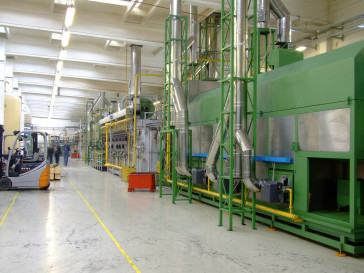Inmiddels weten we dat veel patiënten geen op onderzoeksresultaten gebaseerde zorg krijgen of zorg krijgen die overbodig of zelfs potentieel schadelijk is. Ondanks deze kennis is minder bekend hoe deze internationaal bestaande kloof tussen onderzoek en de verpleegkundige praktijk te overbruggen is. Gebruikelijke implementatiestrategieën die deze kloof proberen te dichten, zijn vaak gericht op de individuele professional en minder vaak op de sociale omgeving of de context waarin de verpleegkundige werkzaam is. In het proefschrift van Gerda Holleman probeert zij meer inzicht te krijgen in de rol die de context heeft bij het implementeren van evidence-based practice (EBP) in de verpleegkundige praktijk. Ze maakt een onderscheid tussen drie elementen in de sociale context: de professionele verpleegkundige beroepsorganisaties, de verpleegkundige opinieleider (een gerespecteerd persoon in een gezondheidszorgorganisatie die innovatiekennis heeft en gemotiveerd is implementatie tot een succes te maken) en de verpleegkundige teams.
LINK
The extent to which mentor teachers are able to address mentees' individual needs is an important factor in the success of mentoring. A two-dimensional model of mentor teacher roles in mentoring dialogues, entitled MERID, is explored empirically. Data regarding five aspects of mentoring dialogues were collected, using a sample of 20 transcriptions of mentoring dialogues, in which 112 topics were discussed and 440 mentor teacher utterances emerged. Correlations between the five aspects were determined and a cluster analysis was conducted. There is empirical support for the model. It is a useful framework to promote reflection on mentor teachers' supervisory behaviour.
DOCUMENT

Objective This study aims to better understand how new future-oriented nursing roles are enacted in a general hospital. Design A learning history, that is, a participatory action-oriented research design to explore and foster organizational learning. Methods Data collection consisted of a (historical) document analysis, the shadowing of differentiated nursing practices (36 h), 22 open interviews, 4 oral history interviews, 2 focus groups and a podcast series (7 h) created with participants. Results The data gathered revealed three important themes regarding enacting new nursing roles: (1) stretching the nature of nursing work, (2) using earlier experiences and (3) collectively tackling taboos. Conclusions Differentiated nursing practices and enacting new nursing roles have long and complex histories. Attempts to differentiate are often met with resistance from within the nursing profession. This study shows how the new role of nurse coordinator was negotiated in nursing teams. With a bottom-up approach focused on collective responsibilities. By acknowledging and reflecting on the past, spaces were enacted in which the role of nurse coordinator became one role, among others, in the delivery of patient care. Impact This study provides an innovative perspective on differentiated nursing practices by focusing on the past, the present and the future. We found that local, situated conditions can be taken as starting points when new nursing roles are enacted. In addition, shifting focus from individual nursing roles to nursing team development, emphasizing collective responsibilities, softens strong (historically) grown emotions and creates spaces in which new roles become negotiable. Patient or Public Contribution No patient or public contribution.
LINK
The research proposal aims to improve the design and verification process for coastal protection works. With global sea levels rising, the Netherlands, in particular, faces the challenge of protecting its coastline from potential flooding. Four strategies for coastal protection are recognized: protection-closed (dikes, dams, dunes), protection-open (storm surge barriers), advancing the coastline (beach suppletion, reclamation), and accommodation through "living with water" concepts. The construction process of coastal protection works involves collaboration between the client and contractors. Different roles, such as project management, project control, stakeholder management, technical management, and contract management, work together to ensure the project's success. The design and verification process is crucial in coastal protection projects. The contract may include functional requirements or detailed design specifications. Design drawings with tolerances are created before construction begins. During construction and final verification, the design is measured using survey data. The accuracy of the measurement techniques used can impact the construction process and may lead to contractual issues if not properly planned. The problem addressed in the research proposal is the lack of a comprehensive and consistent process for defining and verifying design specifications in coastal protection projects. Existing documents focus on specific aspects of the process but do not provide a holistic approach. The research aims to improve the definition and verification of design specifications through a systematic review of contractual parameters and survey methods. It seeks to reduce potential claims, improve safety, enhance the competitiveness of maritime construction companies, and decrease time spent on contractual discussions. The research will have several outcomes, including a body of knowledge describing existing and best practices, a set of best practices and recommendations for verifying specific design parameters, and supporting documents such as algorithms for verification.
Kwaliteitscontroles in productieprocessen in de maakindustrie zijn vaak destructief en daarmee niet duurzaam. In dit project onderzoeken we hoe door toepassing van process mining op real time sensor data de kwaliteitscontrole al tijdens het productieproces kan worden uitgevoerd en potentiële problemen vroegtijdig ontdekt.

Kwaliteitscontroles in productieprocessen in de maakindustrie zijn vaak destructief en daarmee niet duurzaam. In dit project onderzoeken we hoe door toepassing van process mining op real time sensor data de kwaliteitscontrole al tijdens het productieproces kan worden uitgevoerd en potentiële problemen vroegtijdig ontdekt.Doel Het doel van het project is om op basis van realtime data de kwaliteit van het eindproduct van het productieproces te kunnen voorspellen en waar nodig het productieproces bij te sturen. Hiermee kan de industrie duurzamer werken. Resultaten Het project levert een AI software toolkit op met methoden en algoritmen voor toepassing in de productieprocessen in verschillende industrieën. Looptijd 15 januari 2021 - 15 november 2024 Aanpak Nieuwe process mining algoritmes worden ontwikkeld en getoetst in case studies bij verschillende industriële bedrijven. Op basis van de uitkomsten wordt een software toolkit ontwikkeld voor toepassing in de praktijk. Impact op onderwijs Studenten van instituut voor ICT gaan, samen met studenten van TU Eindhoven, cases studies uitvoeren bij verschillende industrieën. Cofinanciering Het project wordt gefinancierd door NWO (Nederlandse Organisatie voor Wetenschappelijk Onderzoek).